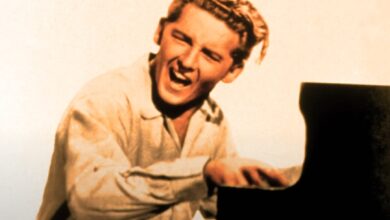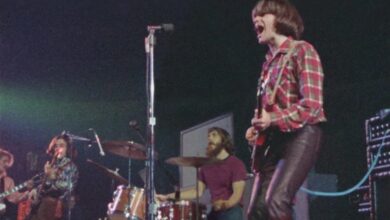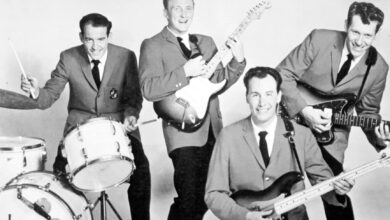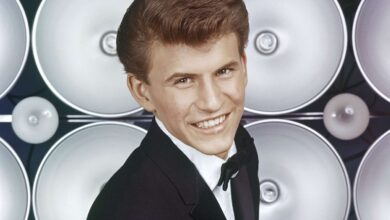Wayne Fontana & The Mindbenders’ “The Game of Love” Brings British Beat to America’s Doorstep in 1965
Released in early 1965, “The Game of Love” by Wayne Fontana & The Mindbenders captured the playful essence of British beat music while delivering one of the most infectious choruses of the decade. The single quickly rose to prominence, reaching No. 1 on the Billboard Hot 100 in the United States and climbing to No. 2 on the UK Singles Chart. With its tight rhythm, bold vocals, and hook-laden structure, it became one of the standout transatlantic hits during the height of the British Invasion. Unlike the more complex or experimental songs that would define the latter half of the 1960s, “The Game of Love” embraced simplicity—and in doing so, carved out a lasting place in pop history.
Wayne Fontana, born Glyn Geoffrey Ellis in Manchester, England, took his stage name from Elvis Presley’s drummer D.J. Fontana and formed The Mindbenders in 1963. The group quickly built a reputation on the local club circuit for their energetic performances and charismatic presence. Fontana’s powerful vocals and on-stage magnetism gave the band a defining focal point, while The Mindbenders—comprised of Eric Stewart on guitar, Bob Lang on bass, and Ric Rothwell on drums—brought a tight and efficient musicianship that blended seamlessly with the Merseybeat sound. Though they arrived slightly later than some of their British peers, their style was rooted in the same energetic, rhythm-and-blues-influenced template that had taken the world by storm.
The story behind “The Game of Love” begins with two prolific British songwriters: Clint Ballard Jr., who penned the track, and Jack Baverstock, who served as the band’s producer. Ballard was already known for writing catchy and commercially successful pop tunes, including “You’re No Good” (later a hit for Linda Ronstadt). He designed “The Game of Love” to be direct and radio-friendly, a burst of controlled excitement that would capitalize on the American appetite for all things British. The lyrics, while simple, were laced with a kind of sly confidence, framing romance as a competitive sport—an idea that resonated with both teen audiences and the broader pop-listening public.
The production of “The Game of Love” was crisp and calculated, recorded at Philips Studios in London with a sound engineered to stand out on AM radio. The song opens with an assertive drumbeat before launching into a chugging guitar rhythm and Fontana’s bold vocal declaration: “The purpose of a man is to love a woman / And the purpose of a woman is to love a man.” The lyrics are punctuated by tight backing vocals and a handclap-laden beat that propels the song forward with infectious energy. The instrumental interplay is punchy and concise, showing the band’s cohesion and producer Baverstock’s ear for immediacy.
Upon its release in February 1965, “The Game of Love” received immediate radio play and shot up the charts on both sides of the Atlantic. In America, where British acts were enjoying unprecedented popularity, the song’s undeniable catchiness helped it topple established homegrown talent, eventually securing the No. 1 spot on the Billboard Hot 100 by April. In the UK, it peaked at No. 2, narrowly missing the top position but still marking the band’s highest-charting hit. Its success brought the group into the spotlight with television appearances, including a performance on Shindig! in the U.S., solidifying their status as one of the most promising British exports of the year.
Culturally, “The Game of Love” contributed to the lighter, more joyful aspect of the British Invasion. While other acts were delving into folk-rock, political commentary, or psychedelia, Wayne Fontana & The Mindbenders delivered pure pop euphoria. The song became a fixture at dances, on jukeboxes, and in teenage bedrooms, offering an upbeat contrast to the increasingly introspective tone of the decade’s music. Its straightforward message of romantic pursuit framed with catchy phrasing made it especially relatable to a young audience still navigating the emotions the song played on.
The impact of “The Game of Love” on Wayne Fontana & The Mindbenders was both immediate and transformative. It turned them from regional favorites into international stars almost overnight. With tours booked across the U.S., including appearances alongside other British Invasion bands, they found themselves caught in the whirlwind of pop stardom. However, that momentum was short-lived. Just a few months after the song’s success, Wayne Fontana left the group mid-performance, citing creative differences and personal stress. The Mindbenders would carry on without him, but the initial magic of the original lineup was difficult to recapture.
Within the genre, the song’s influence could be felt in the way it reaffirmed the value of tight, concise pop arrangements. It encouraged producers and labels to seek out similarly structured, upbeat singles from other bands, contributing to the popularity of what some would label “bubblegum rock.” While “The Game of Love” lacked the lyrical depth of later 60s fare, it proved that a well-crafted three-minute single could still dominate the airwaves and win over fans globally.
Notably, “The Game of Love” has been covered and revisited by multiple artists in the decades since its release. In 1997, the British band Freedom recorded a version for a compilation album, and Fontana himself would revisit the song in solo performances for years to come. While none of these renditions quite matched the spark of the original, their existence is a testament to the song’s staying power and universal theme.
At the time of the song’s release and subsequent success, Wayne Fontana was dealing with the pressures of fame and the personal toll of sudden celebrity. His departure from The Mindbenders marked the beginning of a more troubled period in his life, one marked by sporadic solo efforts and eventual withdrawal from the music industry. Meanwhile, Eric Stewart of The Mindbenders would go on to co-found 10cc, one of the most inventive British bands of the 1970s—a direct legacy of the professionalism honed during this earlier chapter.
In the decades that followed, “The Game of Love” continued to hold a spot in oldies rotations and pop culture retrospectives. Though not as widely remembered today as other British Invasion hits, it remains emblematic of the era’s spirit—bright, brief, and brimming with youthful exuberance. Its placement on numerous “Best of the 60s” compilations and its presence in period film soundtracks help preserve its charm for newer audiences.
Musically, the song helped set a template for how British bands could craft accessible hits for American audiences. It anticipated later trends in power pop and new wave by proving that precision and melody could stand tall in a landscape increasingly leaning toward experimentation. The economy of arrangement, the clarity of Fontana’s delivery, and the universal appeal of the lyrics became lessons absorbed by many who came after.
Although Wayne Fontana passed away in 2020, “The Game of Love” remains his defining contribution to popular music. His brief but bright presence in the 1960s left a lasting impression, and this song stands as his legacy—an upbeat, punchy reminder of what pop music could be when done just right.
Ultimately, “The Game of Love” is a time capsule from 1965—uncomplicated, joyous, and driven by pure pop instinct. It may not have redefined the genre, but it embraced everything that made the British Invasion so thrilling: catchy choruses, youthful energy, and a sense of fun that remains infectious to this day. For a few golden minutes, Wayne Fontana & The Mindbenders ruled the radio, and they did it with a song that still knows how to play the game.



